This Week in Resilience: Twitter
A Mack truck - or rather a Cybertruck - hit social media giant Twitter recently. Since his purchase and self-appointment as CEO, Elon Musk brought a sink to work, fired half the workforce, forced the rest back to the office, bickered with advertisers, undermined the verified "blue check" in a spectacular fail, spooked investors, and activated legions of trolls. In the process, he amped up the stress levels of 3,500 unfortunate workers and their families who now must add "Faustian bargain" to the long list of stressors in their lives.
If you've read my book Reinventing Resilience, you know that I define resilience as "the courage and confidence to grow through challenges." And the key resilience attributes I noticed in dozens of companies I studied was collective efficacy (a strong shared belief that the company can win even if it's facing a tough challenge) and staunch realism (the calm rational ability to see and understand the internal and external landscape for what it truly is). Together collective efficacy and staunch realism generate the courage and confidence to grow through challenges.
Twitter is not looking too resilient at the moment. It may survive, but it'll be a long time before workers at the company truly thrive. Workplace stress is a huge problem, and workers are growing tired of CEOs who pursue profit at the expense of people. When leaders use old, outdated leadership models on a new, enlightened workforce things break. People either quit - because they have the resources to do so - or they stay and suffer.
The World Health Organization added burnout to the International Classification of Diseases. And Stanford University Professor Jeffrey Pfeffer says workplace stress is the fifth-leading cause of death in the United States. Sadly, this week the needle has moved in the wrong direction. It's very likely that Musk - through his actions - has extended the global workplace stress epidemic just a bit and reduced his company's ability to not only bounce back, but to grow through difficulty.
My Advice: Use the Reinventing Resilience model.
I have a model in my book that would have helped Musk think about making necessary changes at Twitter, keep workers from overloading on stress, and set the company up for long term success. Below are a few ways Musk could have strengthened the key qualities of organizational resilience:
The Reinventing Resilience model (c) Paul Thallner
Identify Blockers. A blocker is a force that stops or slows organizational momentum. Internal blockers often appear over and over as predictable patterns of behavior. For example, many companies reflexively enact cost-cutting when earnings fall short. Musk's actions were quick and severe - and their effectiveness is open to discussion. Whether it's the right call or not, when a behavior is automatic, there's no room for new, fresh thinking. Did Musk identify patterns of organizational behavior in order to foresee the response to his actions? It's unclear. But, my gut tells me that more time assessing how or why Twitter was stuck would have led to different choices.
Accept & Understand the Situation. Most leaders want to "rip the band-aid" off. And when they say that, they are admitting to impatience with or ignorance of the situation. Either way, the one-sided nature of this thinking creates divides between different groups within the same company. Everyone goes to their corners with their own version of reality. Musk is pushing his version of reality on everyone else and shutting down the expression of any other perspective. Failing to be open to what's really true is trap that Musk is falling into.
Access Resources. Musk made some hasty moves, and now he's calling some fired workers back because they're essential to keeping the company going. OOPS. By understanding the resources first, Musk could have avoided the embarrassing and costly mistake of cutting the very people who could keep Twitter going. Going forward, he can work to understand the capabilities that people bring to the table.
Discover Possibilities. The emphasis is on "discover." Show up as a person, not a dictator. I'm not suggesting he be nice all the time. But, the way forward rarely comes from the mind of a single person. Enlisting bright talent (that's left) and being open to a variety of perspectives usually generates innovative, new and pragmatic possibilities. It appears as though Musk arrived with his mind made up and an unwillingness to develop a way forward with leaders who knew the business well.
Interested in reading more?
Grab a copy of Reinventing Resilience today.

